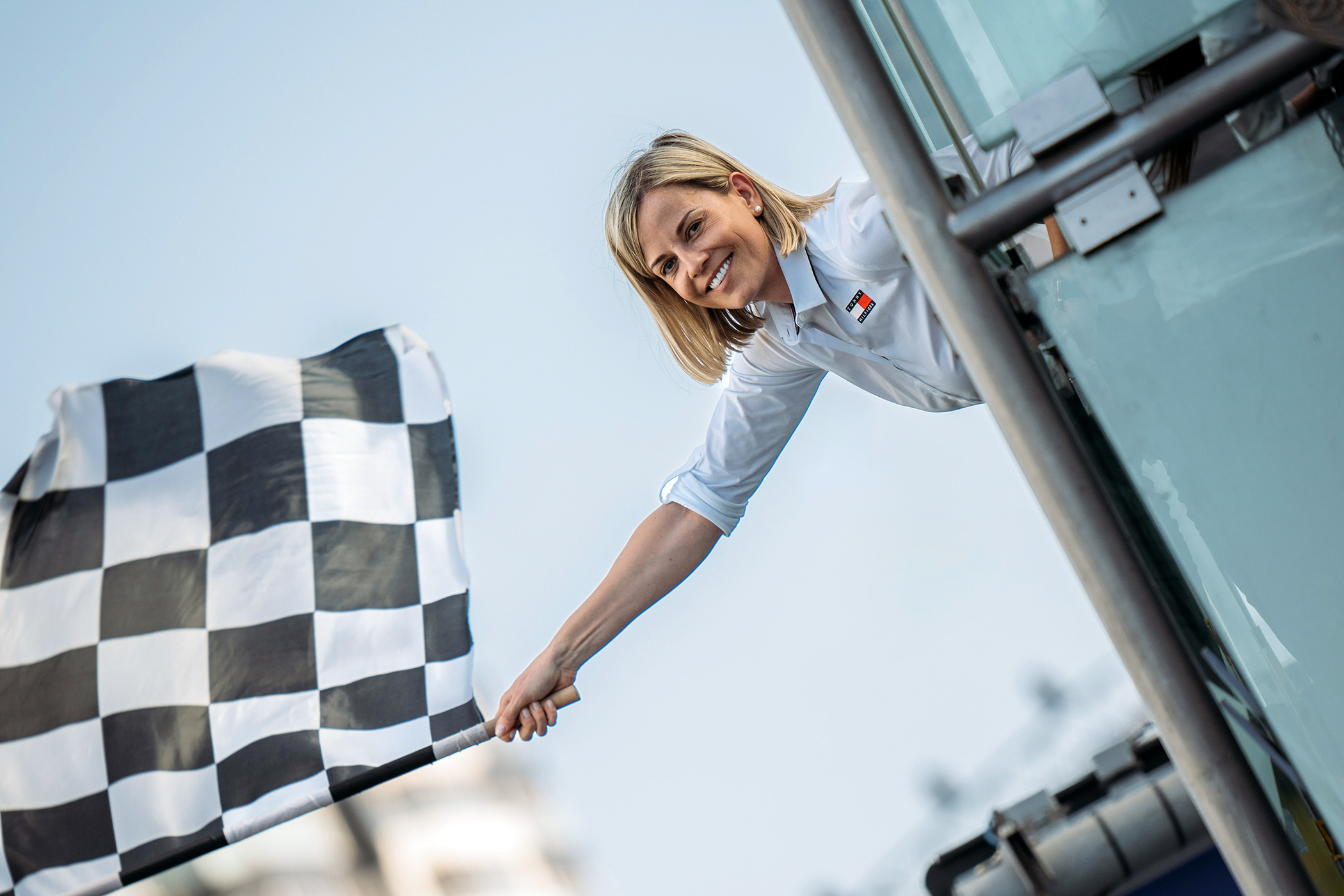Susie Wolff was accustomed to being told to get out of the men’s way.
At the age of 23, she signed a coveted contract as a Mercedes-Benz team driver in the Deutsche Tourenwagen Masters series.
That was in 2006, the dubious days of grid girls. “Beat her” was the simple advice former F1 driver Niki Lauda gave to his son and Wolff’s rival Mathias Lauda.
Wolff faced overwhelmingly male competition throughout her driving career, storming through the karting world from the age of eight, competing in Formula Renault and DTM, and then becoming the Williams Formula One team development driver in 2012.
She chose to open her recently published memoir, Driven, with what is perhaps the most famous moment of her racing career: her F1 test drive for Williams in 2015.
“In those moments I managed to grab the chances with both hands, because it was only supposed to be 25 laps, nothing more,” Wolff said over Zoom, during a book tour stop in her native Scotland.
Time has given Wolff fresh perspectives, now 42 and the ever-polished, sharp managing director of F1 Academy. She admits in her autobiography that she was not up to the level of the top-performing drivers of her class like Lewis Hamilton – even if petrolheads still debate whether Wolff was sidelined when the German driver Adrian Sutil was chosen as reserve for Williams.
Wolff’s first test drive at the British GP was nonetheless a defining moment in motorsport history. It had been 22 years since a woman participated in an F1 weekend, and ten years later she remains the last woman to compete. The strain to her neck, equivalent to five times the weight of her helmeted head while hurtling round the racetrack, was the only thing that distracted Wolff from the pressure to perform – and to not crash.
Related articles:
“It was always more than me just being a racing driver trying to do well,” said Wolff.
“Some said: ‘Could a woman drive a modern F1 car? Could she actually be quick?’”
Newsletters
Choose the newsletters you want to receive
View more
For information about how The Observer protects your data, read our Privacy Policy
Success in the sport can rarely be measured in podium wins alone. While Wolff won multiple karting titles and Formula E championships as Venturi’s team principal, the relative failures because of two-tenths time margins were far more common. Wolff forgets the number of losses: the biggest hurdle to overcome to improve results, even more so than gender, is finance.
The cost cap on F1 teams is reportedly rising to $215m for 2026, but even humble beginnings in karting competitions can setback young drivers by around £10,000 each season. Wolff’s F1 Academy heavily subsidises their 18 drivers in the all-female, Formula 4-level series. This still leaves a small fortune of £100,000 for them each to acquire – even if down from £150,000 in 2023 – primarily through a “minefield” of brand deals and juggling full-time jobs, or all too often with the boost of familial wealth.
Wolff says this is the stark reality of the sport, and became part and parcel of her competitive career growing up. “If you don't have the money to go racing, you’re never going to fulfil any ambition. It was hugely challenging because there’ll always be someone that has more money, more test days, more new tires, that can be in a better team than you.
“I get quite frustrated even now when I see so many young drivers that we would like to help, but it’s just impossible to help everybody. The most powerful woman in motorsport is candid: “The sport is expensive. It always has been, and it always will be.”
Wolff had drive and ambition right from her biking and karting roots, where she was tirelessly supported by her family in the West Scotland port town of Oban. She was acutely aware of her image throughout her teenage years and into her twenties, when casual misogyny was commonplace at race days and media attention meant photoshoots filled with leather hotpants and humiliatingly tokenistic award ceremonies.
From requesting pink side pods on her childhood go-kart, to her silver-lined racesuit and the infamous pink promotional Mercedes car she had to compete in, Wolff’s journey to sharing her femininity was complicated by the “Barbie” implications bestowed upon a woman succeeding in her sport. Yet she describes how this brought more young women to the races, setting a new precedent for women in motorsport where they are now solely judged on performance.
“I look back and think, thank goodness I had such thick skin,” Wolff said.
“The world has changed since then with the Me Too movement, and some argue it's gone too far. I say it had to move, and I think it has moved. And that's definitely something positive, not just for women in motorsport.”
Wolff was the natural choice to lead F1 Academy from its launch in 2022 given her experience on and off the track, business acumen in Formula E and the success of her female-focused initiative Dare to be Different (now FIA Girls on Track). She credits the triumphs of F1 Academy, the star of its own Netflix docuseries last May, to the investment and support of Formula 1. All ten teams signed on to the series, and drivers like Mercedes’s Doriane Pin and Ferrari’s Maya Weug are prospects for the winning seat in the third-tier Formula Regional European Championship.
Motorsport now boasts a 42% female global fanbase, but the power in driving change comes significantly from brands. Beauty giant Charlotte Tilbury, luxury brands Tommy Hilfiger and Tag Heuer and mega bank Morgan Stanley all saw the commercial potential of F1 Academy as partners. I asked Wolff what the concept of “brands building the sport for women” means in practice.
“I don’t have the reach of Formula One. It’s 75 years-old and I’m three years-old,” explained Wolff. “But what brands said to me was ‘we want to help you build so that you will be in a position in 3, 5, 10 years that you do have the eyeballs, the broadcast deals.’
“Suddenly the brands were coming to Formula One and saying, ‘It's not a question for us to come in and only do F1 without F1 Academy.’” Wolff notes that this is somewhat unique to her sport, arguing that elsewhere “the rise in the women's game is seen as a little bit of a threat to the men's game.”
One of the first supporters of F1 Academy was the Saudi Arabian oil giant Aramco, mere years after the ban on women driving in Saudi Arabia was lifted. This is often shaped as female progression, yet as Gulf funds and Saudi hosting become bigger players across motorsport investment, ethical concerns over the state’s human rights record come to the fore.
When Wolff was asked to be an ambassador for the first Formula E race in Diriyah in 2018, her initial reaction was “absolutely not.” But she soon saw this as a chance to be part of longer-term action, and points to the significance of having a young Saudi driver on the grid in F1 Academy’s first year. “I realised I can either be part of the change or I can stand on the sidelines and criticise, and I want to be part of the change. I want to create opportunities and help the next generation.”
Photograph by Jason Vian/Courtesy of Formula 1



